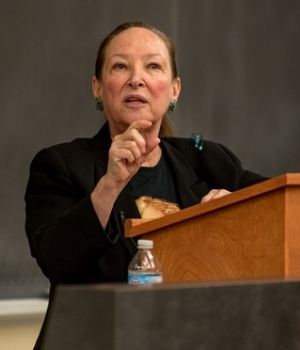
Addressing the Queen’s Law community last week, Justice Rosalie Abella of the Supreme Court of Canada (SCC) shared stories on her experiences – from breaking into the judiciary as the youngest and first pregnant judge in the country to becoming the first Jewish woman to sit on its highest court.
“When I was one of five women in a class of 150 law students,” Abella said, “if someone told me I would be on the bench, I would’ve said ‘that’s ridiculous.’”
Abella was appointed to the Ontario Family Court in 1976. She said she never thought about whether career choices she made would adhere to any path. “I never say no to anything, as long as it sounds interesting.”
That led her to stints at the Ontario Labour Relations Board, Ontario Law Reform Commission, Ontario Human Rights Commission, teaching law at McGill, and, most famously, chairing the royal commission that coined the term “employment equity.”
Appointed to the Ontario Court of Appeal in 1992 and the Supreme Court of Canada in 2004, Abella is known for her strong defence of human rights. For instance, one of her early SCC judgments in R. v D.B.struck down Youth Criminal Justice Act offences that automatically charge young people as adults, arguing they have a “presumption of diminished moral blameworthiness based on age.” She also authored the landmark 2015 decision in Saskatchewan Federation of Labour v Saskatchewan, which found the Charter’s freedom of association includes the right to strike.
In a special question-and-answer session, students quizzed Abella about her views on a variety of topics.
On judicial activism, she said judges must confront their own views and referred to discourse on the issue as being merely a cloak for attacking opinions that critics didn’t like. “‘We don’t want judges with views,’ they said. Which meant they didn’t want feminists,” Abella explained. “The trick as a judge is understanding and acknowledging you have opinions and then having an open mind about them.”
Responding to a question about increasing diversity on the SCC, she said: “We have things to fix, and we will. Everybody’s talking about it. That’s a good thing. It means it will happen.”
Asked about the state of the world today, she spoke of a “global trend that worries [her],” the breakdown of “many of the democratic values that emerged as consensus after WWII.
“If we don’t have free speech, the right to dissent, diversity and respect for difference, I don’t know what kind of world we’ll have.”
She concluded that she’s hopeful the foundation of our Canadian social and political institutions will be more resilient than we expect. “I don’t think it’s fragile – it hasn’t been in my lifetime.”
By Jeremy Mutton